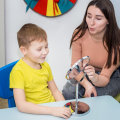

The Three Most Important Qualities of a Speech Language Pathologist That You Can’t Learn in School
All SLPs follow a fairly standardized path into professional practice. They all start by earning a master’s degree from a program accredited by the Council on Academic Accreditation in Audiology and Speech-Language Pathology (CAA), followed by a clinical fellowship, and then pass the ETS Praxis II: Subject Assessment in Speech-Language Pathology as the final step to earning state licensure. As a result, all speech-language pathologists are equipped with a similar foundation of knowledge and skills that allows them to successfully engage in the assessment and treatment of disorders related to speech, social communication, language, cognitive-communication, and swallowing for both adults and children.
While CCC-SLP certification and a state license serve as your credentials as a speech-language pathologist, authorizing you to practice SLP in the state in which you’re licensed, they don’t speak to those soft skills that turn a speech-language pathologist into an exceptional one.
Soft skills needed to be a speech and language therapist are vital – perhaps just as vital as the concrete scientific know-how and therapeutic skills taught through a master’s in SLP and clinical fellowship. You’ve likely heard people talk about a doctor’s “bedside manner” —a unique term to describe how well (or poorly) they interact with their patients. Speech-language pathologists, like any other clinician, must also work on creating an environment that allows them to better connect with their patients on a human level. This is the magic behind effectively turning a purely clinical relationship into a personal one.
Anybody who has been in the field long enough to have some experience working with a diverse group of patients will tell you that their bedside manner is something they consistently work to improve throughout their SLP careers . You can’t expect to enter the speech-language pathology profession with your soft skills already honed to perfection. It takes experience and a thoughtful approach to each client interaction to reach that level, but in time it will become second nature.
So, what makes a good speech therapist, and what are the most important qualities of a speech therapist? You could come up with a long list of ways in which to make client interactions more positive and effective for both you and the patients you treat, but there are just three that stand out as the most qualities of a speech and language therapist:
1. Being Compassionate Is Perhaps the Single Most Important Quality of a Speech-Language Pathologist
2. Good Energy is Another One of those Vital SLP Qualities That Has to Come Naturally
3. Creativity Is an All-Important SLP Quality That You Won’t Learn in School
1 – Being Compassionate Is Perhaps the Single Most Important Quality of a Speech-Language Pathologist

While compassion in speech-language pathology practice may be an obvious quality for therapists to possess, it’s also one of those qualities that’s easily forgotten at the end of a long day dealing with stressful situations and challenging patients. Having compassion means taking the time to:
- Recognize and appreciate a patient’s challenges, stressors, fears, and concerns
- Free yourself of personal biases or assumptions
- Ask questions and acknowledge a patient’s feelings
If you can make a concerted effort to compassionately interact with every patient, every time – even the last client of the day showing up late to their appointment – then you’ll be rewarded with more positive patient interactions and better results from your SLP therapy sessions.
2 – Good Energy is Another One of those Vital SLP Qualities That Has to Come Naturally

Positive energy comes from a warm smile, eye contact, and positive language that shows you are excited to be part of their speech-language therapy program. For example, with adults, this might be conveyed with a statement like: “I am really looking forward to seeing what we can accomplish today.” … “I think we made great strides last session; let’s work on continuing that today.” … “I am really happy to be here with you today.” … “Your hard work is really starting to pay off.”
With children, enthusiasm may come complete with high fives, clapping, and cheering. Gauge the needs of the child and their response to positive praise. Keep in mind each child will respond differently to enthusiasm. For example, a child with autism may have a negative reaction to loud or enthusiastic displays. Instead, you may show your enthusiasm through positive praise and a fist bump.
When using positive encouragement for children, make it a point to use behavior-based praise (“You tried really hard. That’s great!”) instead of personal praise (“You’re a good girl!”). Behavior-based praise is known to motivate children to take on challenges and strive toward goals.
Many SLP therapy treatments are frustrating for patients, and success in the field is rarely achieved in the short-term, so you can bet some of your patients will approach their SLP therapy sessions with little to no enthusiasm of their own. It’s your job to set the tone of each SLP therapy session by putting your enthusiasm and positive outlook on display.
Never underestimate enthusiasm among the important qualities of a speech therapist!
3 – Creativity Is an All-Important SLP Quality That You Won’t Learn in School

Make it a point to create and implement new strategies and techniques to make each therapy session fun, interesting, and challenging. The freedom to be able to flex your creative muscles is one of the great benefits of being a SLP !
For children, creativity means paying close attention to what interests them and then providing a nice variety of SLP techniques that aligns with their interests. For some children, it may mean playing a silly game, while for others, it may mean a fun arts and crafts activity.
Monotony is the downfall of any effective SLP therapy session, so it’s always beneficial to switch up techniques and strategies. New and exciting ways to approach speech-language therapy is the best way to keep your patients motivated and engaged, regardless of their age!
An important aspect of your job as an SLP is to be a coach and motivator, and the best way to motivate your patients is by keeping things interesting.
Do these qualities of a successful speech-language therapist sound like you? Learn more about becoming an SLP !
- Calvin University - Calvin University's Online Speech and Hearing Foundations Certificate - Helps You Gain a Strong Foundation for Your Speech-Language Pathology Career.
- Emerson College - Master's in Speech-Language Pathology online - Prepare to become an SLP in as few as 20 months. No GRE required. Scholarships available.
- NYU Steinhardt - NYU Steinhardt's Master of Science in Communicative Sciences and Disorders online - ASHA-accredited. Bachelor's degree required. Graduate prepared to pursue licensure.
- Arizona State University - Online - Online Bachelor of Science in Speech and Hearing Science - Designed to prepare graduates to work in behavioral health settings or transition to graduate programs in speech-language pathology and audiology.
- Documentation
- Interoperability
- Billing Software
- Online Scheduling
- Digital Intake
- Patient Payments
- Deals for PT
- Clinicient.com
- Keethealth.com
Top qualities of a good speech pathologist.

Want to learn how to be a speech-language pathologist? Just follow the right college degree course, study hard, take your exams, and get your state license. Want to learn how to be a successful speech-language pathologist? Do all of the above and have the right soft skills to support every patient’s journey.
Let’s face it: some things simply can’t be taught in the classroom, especially in such a passion-driven role like a speech-language pathologist. It’s not about going through the motions, passing all your tests, and adding some credentials to your name. Individuals that need speech therapy face a mountain of challenges, from how they succeed at school to how they socialize with others. They need someone on their side who can not only help them overcome speech challenges but also recognize the impact that better speech can have on their lives.
The great majority of speech-language pathologists devote their time to whatever it takes to help their patients live a higher quality of life. That’s why these four traits underscore the true merit and value of a top-performing speech-language pathologist.
Compassionate Empathy
Successful speech-language pathologists don’t just focus on speech exercises but also on how any speech difficulties may impact their patients. This is what we call total care—where you care for the whole persona and not just the specific issue or symptom.
Having the ability to understand and share in someone’s emotions is one of the most traits of a speech pathologist. However, you must be able to balance this compassionate empathy by not taking their struggles on as your own emotions or blurring the line between you and another person.
Having compassionate empathy demonstrates high emotional intelligence, where you can effectively respond to a situation without becoming overwhelmed or feeling like you have to “fix” something. You have a sincere desire to help your patients succeed. Without sensitivity to others’ needs, desires, emotional triggers, and other problems, success in treating and bonding with patients can be limited.
Strong Communication
Understanding your patients and your caseload is crucial to success as a speech-language pathologist. Remember, you are the leader in the provider/patient relationship. Your patients look to you to guide each session and need to be able to trust you can successfully direct them. You should be a skilled teacher and have at least a medium grasp on how to teach someone to perform a task correctly, knowing that not every client will learn the same things in the same ways. Guiding them through steps, whether verbal or physical (such as swallowing), is essential.
A high-performing speech-language pathologist should be able to communicate clearly with a variety of individuals. This applies not only to your patients but also to caretakers, hospitals, PCPs, school personnel (if your patient is a child), and other providers.
Good communication also requires you to be a good listener. If you’re able to listen carefully to the needs and wants of your clients and their caretakers, you can avoid potential issues that come from miscommunications.
Scientific Aptitude
Speech-language pathology is rooted in science (both biological and social). Successful speech therapists have an affinity for science, anatomy, and language. It requires ongoing professional development and education as new findings and advancements are discovered. Even when you’re no longer in a classroom setting, science will continue to shape your career.
You can also share your love for science with your clients. Help them see the science behind your sessions together. Make it relatable so they can get more from your time together (and even enjoy it!).
Persistence
Rome wasn’t built in a day, and speech difficulties can’t be solved in one session. In fact, speech-language pathologists won’t know an “end” date to working with their clients because everyone progresses at different rates. They also don’t always know what tools or tricks they’ll need to pull out of their hat.
That’s why you need to be able to think on your feet. A high-performing speech-language pathologist will always have things on hand—office supplies, spare pens, pads of paper—that you may not need but could come in handy. Improvisation and the ability to adjust plans or care at a moment’s notice are wonderful skills to have. Adapt to the situation rather than assuming a situation will adapt to you and your needs.
You also need to be able to see your cases through to the end. Sometimes, your caseload or clients may be difficult, but having the grit to stick it out and progress to the other side is a highly desired trait. You can’t always tell which clients will bring the most difficulties or challenges until after you start working together. Dropping a client halfway through a task is never a good start, as it can be discouraging for them to find another provider and start the process over.
Knowing how to proceed in every situation will always be rewarded, no matter the challenges.
Final Thoughts
So, do you have any of these qualities of a good speech pathologist? If so, know that your career looks good on you!
Leave a Reply Cancel reply
Your email address will not be published. Required fields are marked *
Save my name, email, and website in this browser for the next time I comment.
Related Content

The No Surprises Act: Good Faith Estimates for Rehab Therapy.

Speech-Language Pathology Acronyms & Abbreviations

CPT codes for physical, occupational, and speech therapy.
- What qualities make a good speech therapist?
Characteristics of the ideal SLP: Teachable, solid ethics, good communication skills, technologically capable, well-versed in good business practices, curiosity, entrepreneurship, empathy. Having the ability to understand and share a person's emotions is one of the main characteristics of a speech therapist.

Characteristics of the ideal SLP: Teachable, solid ethics, good communication skills, technologically capable, well-versed in good business practices, curiosity, entrepreneurship, empathy. Having the ability to understand and share a person's emotions is one of the main characteristics of a speech therapist. However, you must be able to balance this compassionate empathy by not taking your struggles as if they were your own emotions or blurring the line that separates you from someone else. Having compassionate empathy demonstrates great emotional intelligence, which allows you to respond effectively to a situation without feeling overwhelmed or feeling like you have to “fix” something.
He has a sincere desire to help his patients succeed. If you are not sensitive to the needs, wants, emotional triggers, and other problems of others, success in treating patients and building relationships with them may be limited. At SpeechEase, we have trained, mentored, and developed many wonderful speech therapists who have made a lasting impact on the lives of their clients. These are the 5 main traits we think all good speech therapists have.
A high-performing speech-language pathologist should be able to communicate clearly with a variety of people. Successful speech therapists not only focus on speech exercises, but also on how speech difficulties can affect their patients. While compassion in the practice of speech-language pathology may be an obvious quality for therapists, it's also one of those qualities that are easily forgotten at the end of a long day dealing with stressful situations and challenging patients. Good speeches learn throughout their lives and are eager to hone their skills or discover new therapeutic approaches.
People who need speech therapy face a mountain of challenges, from how they succeed in school to how they socialize with others. That's why these four traits underscore the true merit and value of a best-performing speech-language pathologist. SpeechEase has clinics in Mackay and Townsville, which have a team of fun, happy and supportive people with a desire to help people with speech and language problems to make themselves known for what they are, to have a voice and to show the world that they have something to say that is worth listening to. If you're interested in pursuing a career in speech-language pathology, you may be wondering what personal characteristics and attributes speech-language pathologists (SLP) need to succeed beyond possessing the knowledge and skills specific to the profession.
While the CCC-SLP certification and a state license serve as credentials as a speech-language pathologist, authorizing you to practice SLP in the state where you are licensed, they do not reflect those interpersonal skills that make a speech-language pathologist exceptional. The social skills needed to be a speech therapist and speech therapist are vital, perhaps just as vital as the concrete scientific knowledge and therapeutic skills taught through a master's degree in SLP and a clinical fellowship. The Communication Sciences and Disorders program provides a unique educational opportunity for students to become highly qualified speech-language pathologists. They need someone on their side who can not only help them overcome speech challenges, but who also recognizes the impact that a better way of speaking can have on their lives.
If you recognize yourself in these traits and are a qualified speech pathologist, we would love to hear from you. As a result, all speech therapists have a similar base of knowledge and skills that allow them to successfully dedicate themselves to the evaluation and treatment of disorders related to speech, social communication, language, cognitive communication, and swallowing, in both adults and children.

- What are five things you can do to encourage speech and language development?

- When should you seek speech therapy?

- Speech Therapy Techniques: A Comprehensive Guide

- Common Speech Disorders: An Expert's Guide
- How Long Does Speech Therapy Last? A Comprehensive Guide to Maximizing Success
- Speech Therapy: A Comprehensive Guide to Understanding and Treating Speech Disorders
- The Benefits of Speech Therapy: A Comprehensive Guide
- Who Can Benefit from Speech Therapy Treatment?
- Speech Therapy: A Comprehensive Guide to Different Types and Benefits
- What are the Goals and Benefits of Speech Therapy?
- How Long Does Speech Therapy Last? An Expert's Guide to Understanding Treatment Duration
- What to Expect During a Speech Therapy Session: A Guide for Patients and Families
- The Benefits of Speech and Language Therapy Explained
- The Difference Between Speech Therapists and Language Pathologists
- What Are the Costs of Speech Therapy? A Comprehensive Guide
- 5 Conditions That Can Be Improved With Speech Therapy: An Expert's Guide
- Can I Do Speech Therapy at Home Without a Therapist?
- Speech Development: Apps and Software Programs to Help Kids Improve Communication Skills
- Using Technology to Support Your Child's Speech Development: An Expert's Guide
- Finding Support for Parents of Children with Communication Disorders
- What Do Speech Pathologists Do? A Comprehensive Guide
- How Long Does it Take to See Results from Speech Therapy?
- The Benefits of Speech Therapy: What is it Good For?
- Achieving Communication Goals with Speech Therapy
- Speech Therapy Games for Preschoolers: Fun Activities to Do at Home
- Speech Therapy: Treating Communication Disorders
- 10 Essential Qualities for a Successful Speech Therapist
- When is the Right Time to Start Speech Therapy for Your Child?
- The Similarities and Differences Between Speech Therapy and Speech Pathology: An Expert's Perspective
- Understanding the Four Major Speech Disorders: Causes, Treatments, and Early Intervention
- What are best practices for speech therapy?
- When should you start speech therapy for stuttering?
- What is speech therapy target?
- How effective is speech therapy for speech delay?
- Can an slp diagnose hearing loss?
- What field of science is speech pathology?
- What is the best major for speech pathology?
- Do speech pathologists make a lot of money?
- Is becoming speech pathologist hard?
- Can an slp make a diagnosis?
- What are the characteristics of a speech and language pathologist?
- What are the disadvantages of being a speech pathologist?
- How does speech therapy work for deaf people?
- What are some examples of speech therapy?
- Is speech therapy for adults effective?
- How long should speech therapy last?
- How do i prepare for speech therapy?
- How long does it take for voice therapy to work?
- What do they do in kids speech therapy?
- What is done during speech therapy?
- How can i make articulation therapy more fun?
- What type of therapy is good for adhd?
- What is speech therapy like for a 2 year old?
- What is meant by speech and language therapy?
What are speech disorders in children?
- How can i make speech therapy more fun?
- What are speech activities?
- Do speech pathologists go to medical school?
- What should i expect from a speech assessment?
- How do you determine speech and language delay?
- What is included in speech therapy?
- What disorders do speech pathologist treat?
- What does a speech pathologist do for hearing loss?
- Do deaf people need speech therapy?
- How long should a child attend speech therapy?
- What type of therapy is best for autism?
- Can an slp diagnose apraxia?
- What do speech therapists look for?
- What is speech therapy app?
- Where are speech pathologist most needed?
- When should you seek a speech pathologist?
- Does autism need speech therapy?
- How can parents help with speech therapy?
- Are there different types of speech therapy?
- Can slp diagnose adhd?
- Can slp diagnose language disorder?
- What activities are used in speech therapy?
- What is the best treatment for high functioning autism?
- What are the goals of a speech therapist?
What gpa do you need to get into slp grad school?
- What is the highest degree for speech pathology?
Is there a difference between a speech therapist and a speech pathologist?
- What skills are needed to be a speech pathologist?
- How can you encourage speech and language development?
- Can a child outgrow speech delay?
- How do speech therapists get fun for adults?
- Why is speech therapy important for dementia?
- What is one of the most important things a speech pathologist does?
- How long does speech sample take?
- Is speech pathology part of the medical field?
- How long should a speech evaluation be?
- Is it normal for a 4 year old to need speech therapy?
- What would you do speech therapy activities?
- Why is speech therapy important?
- What do they test in speech therapy?
- What is the highest paid speech pathologist?
- How do slps treat language disorders?
- What can a parent do if a child has trouble speaking?
- How is apraxia diagnosed?
New Articles

Which cookies do you want to accept?
Qualities of a good speech pathologist
Did you know that speech-language pathology (SLP) is a fascinating healthcare field that evaluates, diagnoses, and treats speech, language, and communication disorders? Speech-language pathologists are superheroes with the incredible opportunity to impact people's quality of life significantly. From toddlers struggling with language development to adults recovering from strokes, SLPs play a vital role in improving communication skills. This article explores the defining characteristics and traits that contribute to the success of a speech-language pathologist.

Core Traits of Successful Speech-Language Pathologists
Empathy and Compassion: A profound sense of empathy and compassion is at the forefront of an SLP's skill set. Understanding and relating to the emotional and psychological experiences of patients is vital. It involves appreciating the frustrations and challenges faced by individuals struggling to communicate, which is essential for building trust and rapport.
Strong Communication Skills: Effective communication goes beyond the ability to speak clearly. For SLPs, it encompasses active listening, interpreting non-verbal cues, and tailoring communication strategies to individual patient needs. It also involves educating and collaborating with family members and other healthcare professionals to provide holistic care.
Detail-Oriented Approach: SLPs must possess a keen eye for detail. This trait is crucial for identifying subtle changes in a patient's progress, understanding the nuances of language and speech disorders, and tailoring treatment plans accordingly.
Patience and Perseverance: The journey to improve speech and communication skills can be lengthy and challenging. SLPs must demonstrate patience and perseverance, encouraging their patients through setbacks and celebrating small victories.
Adaptability and Flexibility: The field of speech-language pathology is diverse, with patients presenting various disorders and backgrounds. An effective SLP must adapt their approach to suit each patient's unique needs and learning styles.
Lifelong Learner Mindset: SLP is an evolving field, with ongoing research and new techniques continually emerging. Successful SLPs are committed to lifelong learning, staying abreast of the latest developments, and integrating new methods into their practice.
Reduce costs and improve your reimbursement rate with a modern, all-in-one clinic management software.
Educational and Professional Requirements
Academic Qualifications: A career in speech-language pathology begins with a solid educational foundation, typically requiring a master's degree in a related field. This education provides the theoretical knowledge and practical skills necessary for effective practice.
Licensing and Certifications: Becoming a licensed speech-language pathologist is a critical step. Requirements vary by region but generally include passing a national examination and fulfilling supervised clinical experience. Some SLPs also pursue additional certifications in specialized areas of the field.
Continuous Professional Development: The commitment to education doesn't end with graduation. Ongoing professional development through workshops, seminars, and advanced courses is essential for maintaining licensure and delivering the highest standard of care.
The Role of Technology in SLP
Technological Advancements: Integrating technology in speech-language pathology has opened new avenues for assessment, therapy, and patient engagement. Technology is reshaping the landscape of SLP from innovative software for language development to apps that assist in articulation practice.
Impact on Therapy and Assessment: Technological tools have enhanced the precision and effectiveness of speech and language assessments, enabling more personalized and engaging therapy sessions. They also offer new ways to track progress and facilitate communication between SLPs and their patients.
Challenges in Speech-Language Pathology: Speech-language pathologists face various challenges, including working with diverse patient groups, each with unique needs and backgrounds. Staying current with the latest research and techniques is another significant challenge, requiring a dedication to ongoing learning and professional growth.
Conclusion
A career in speech-language pathology is both challenging and immensely rewarding. It demands a unique blend of personal traits, professional skills, and a commitment to ongoing education and development. By nurturing these qualities, SLPs play a crucial role in enhancing communication and improving lives.
Related articles
.jpg)
Modern PT Techniques Revolutionizing Rehabilitation
Being a physical therapist puts you at the forefront of helping people manage their pain, restore function, and enhance their quality of life. However, thanks to cutting-edge methods and technologies, the field of rehabilitation is changing quickly. Accepting these developments is essential to stay at the top of your field and give your patients the finest care possible.

Navigating the Maze of Back Pain: Understanding ICD-10-CM Code M54.50
Low back pain is a persistent problem for millions of individuals worldwide, impacting quality of life and generating significant healthcare costs. Accurately capturing and documenting this common ailment involves navigating the intricacies of medical coding, with ICD-10-CM code M54.50 playing a crucial role.

Understanding ICD-10-CM Diagnosis Code R53.1: Weakness
R53.1 is a billable/specific code within the International Classification of Diseases, 10th Revision, Clinical Modification (ICD-10-CM) system. It signifies the diagnosis of weakness, a general term for diminished or absent energy and strength. This code is used for reimbursement in healthcare claims submitted on or after October 1, 2015.
Why settle for long hours of paperwork and bad UI when Spry exists?
.png)
- Pediatric Speech Therapy
- Adult Speech Therapy
- Corporate Consulting
- Our Approach
- Testimonials
- Speech Therapy Client Contact
- Speech Therapy eBook
- Educational Videos
- Book Recommendations
- Children’s Online Tools
- Healthcare Settings
- Join Our Team
Let Us Help

3 Important Qualities of a Speech Therapist
Written by Michelle Mares on February 4, 2022 . Posted in Blog , Speech Therapy .
Finding the right speech therapist for you or your loved one can be stressful. While some requirements are specific to one’s needs, there are 3 basic necessities to look for in a speech therapist with one often neglected.
Three Qualities of a Speech Therapist
Most, if not everyone, look for 3 important qualities in their health care professionals:
- Relatability, which includes personality or great “bedside manner”
Unfortunately, it can be difficult to find all three qualities in a health care professional. I am not saying a speech therapist needs all these characteristics to be a good therapist. I am saying it only serves to enhance the client experience and improve care.
Education and certifications provide the baseline for knowledge but experience must go hand-in-hand with it. The more patients you treat with speech disorders, debilitations, delays, etc. the more knowledge one gains. However, experience does not only pertain to the number of years as a speech-language pathologist. It also includes where or under what setting they gained the experience.
A speech therapist, who primarily worked with school children for 10 years may not be the right fit for your elderly father with swallowing or cognitive issues. I am not saying this speech therapist will do a poor job, but a 5-year therapist working in a skilled nursing facility might be better suited. You need to inquire where your speech therapist gained knowledge and experience.

Now, we all want someone, who is smart and experienced, but you also need someone, who can relate to you. This is very important in all cases. A mom or dad need to have a connection for their child, so they feel comfortable. A son or daughter want a speech therapist, who shows real compassion for their elderly parent. “Bedside manner” is all too often overlooked along the way.
A speech therapist needs passion and understanding for all involved in the healing process. As a therapist, we must look at the situation from the perspective of those we want to help. Simply, a speech therapist needs to be relatable. This creates a stronger connection and faster recovery for our patients. Everyone is capable of earning both knowledge and experience, whether through a degree or years on the job. Personalities, however, are shaped over a long time. How one is raised along with life’s experience shape their personality into adulthood, so it is generally set in stone and difficult to change.
Know Your Speech Therapist
Take time to research a speech therapist. Education and experience are important factors, but we learn a lot about a person by just talking with them. Everyone gets a feel for someone through mere conversation. You can learn a lot about a speech therapist when they offer personal insight relating to your situation.
Look for ways to elicit this information, and see if they “click” with you. Of course, you do not forgo their expertise in the speech-language pathology field. You are looking for what sets a speech therapist or a speech therapy company apart from others. What is their approach to you and your loved one?
Do not be afraid to ask questions. Remember, a speech therapist works for you, so they need to meet your expectations.
Questions For a Speech Therapist
Here are just a few basic questions regarding knowledge and experience. Of course, answers may lead to additional questions, but a good speech therapist will provide open-honest responses.
- How long have you been a speech therapist?
- What is your experience?
- Do you have a specialty?
- Have you worked with people with similar problems as my child (mother, father, etc.)?
- How would you assess my child (mother, father, etc.)?
The Relatable
These types of questions are all too often overlooked. As mentioned, this is not a “make or break” but helps establish the needed connection with your speech therapist. Keep in mind, not everyone wants to share personal experiences, so do not get offended. A reserved therapist is in no way a bad therapist. They still may be the perfect fit for your loved one.
Look for answers through general conversation as opposed to forward questioning. Guide the subject around what specific speech therapy characteristics you find important. Listen for empathy and hope in their voice and whether they focus on your loved one’s strengths versus their weaknesses.
Ask yourself, are they going to partner with me and be my loved one’s advocate? How do you feel after the conversation? Do you feel hopeful and encouraged? There are hard truths but optimism is vital to the patient’s outcome. Keep in mind, you are not looking for a best friend. You are looking for someone, who meets your requirements.
I choose to share my experiences because I am a mom, a daughter, and a speech therapist. I recognize the need to connect with my clients and their families because I sat where they are now.
My Passion, My Understanding, My Speech Therapy Story

Where Speech Theapy Started
As a far back as I can remember, my dream career was to be a physician. It was not until my senior year in high school, I realized my passion was in the process of evolving. My grandfather’s cancer diagnosis led my grandmother to stress and exhaustion causing her to shut down.
I lived with them at the time, so I took every opportunity to help my grandmother around the house as well as take care of my grandfather. This included preparing his PEG tube feedings and going to his doctor appointments.
For comfort, I would lay on his bed and hold his hand while listening to him talk about the angels and tell me about his secret hiding places for money. At the time, I did not realize the magnitude of the situation nor its influence later in life. I did not realize the immense stressors as a 17-year-old, but my time with him was a blessing in an otherwise difficult situation. My love, understanding, and empathy for my adult patients came from many of these moments. I not only have compassion for my patients but their families as well, and I am not afraid to express it.
The Birth of a Speech Therapy Connection
Fast forward several years, and my life took another turn. After 5 years of fertility treatments, my husband and I were blessed with our first boy. He was an active explorer and growing beyond an age-appropriate level for speech and language until he turned 18 months old.
While playing “Ring Around the Rosie” at pre-school, he fell on a toy causing him to bite down nearly severing his tongue in half. Doctor’s informed us stitches would worsen the situation, and it would take several weeks to heal. We never expected his speech and language skills to stop and revert back to a 0–6-month level.
As a speech mom, this was devastating. I now understood and felt a mom’s apprehension regarding their child’s speech delay. It was hard for our son to separate mom from speech therapist, so we placed him in private speech therapy. It took several years to reach his milestones, but he persevered in the end. I never imagined a minor accident would lead to years of delay and speech therapy.
Along the way, I learned being momma was my role in his journey and not as a speech therapist. Experiencing these challenges allows me to establish a deeper connection with my patients and their families, who often convey the same worry.
A Speech Therapist Advocate
After 3 additional years of failed fertility treatments, we decided to adopt. During this process, God blessed us with a second pregnancy. Our second son was born 2 months premature and placed in NICU. He suffered from a nonexistent suck reflex that required feedings through a nasogastric (NG) tube for nearly 6 weeks.
Again, as a mom, I felt the same worry and concern as other moms in this situation. Even as a speech therapist with a feeding specialty, it was difficult to watch him struggle for nutrition. At six weeks, he gradually transitioned to a bottle. I monitored his growth closely and was steadfast in our goal to bring him home at 2 months.
After several midnight calls to his NICU pediatricians, I convinced them to increase bottle feed opportunities. This was difficult for our boy and often left him exhausted, but he was a fighter. The NICU pediatrician discharged him as planned and made certain to inform me it was due to having a speech and feeding therapist for a mom.
This experience taught me the importance of advocacy and fighting for my patients as well as their families.
What sets me apart from others? As a parent and caretaker, I can relate and empathize with those moments of despair, exhaustion, and most of all, the fear of failing a loved one. But, in reality, they are not failed. We are simply instilling hope and providing opportunity for them to succeed.

Michelle Mares
Leave a reply cancel reply.
Your email address will not be published. Required fields are marked *
Save my name, email, and website in this browser for the next time I comment.
Post Comment

Back On Speaking Terms: Top 5 Qualities To Look For In A Speech Therapist
Speech therapy is the savior in more circumstances than many people are aware of. A speech therapist helps those ranging from sufferers of a traumatic brain injury to ADHD students, to those with Alzheimer’s , and much more in-between. When you or a loved one is falling behind in school or not able to communicate the way they’d like to, it’s a difficult time for everyone.
Knowing that there is someone to help you is relieving, but how do you know if a speech therapist is the right fit for you or your loved one? Because their job is such an important one, you want someone who exceeds your expectations. Listed below are the top 5 qualities to look for when selecting a speech therapist.
Your speech therapist should:
1. Use Multiple Motivators During Sessions
It’s your speech therapist’s job to find ways to engage you or your loved one in the session by using multiple motivators during the sessions. The best way to help your therapist find good motivators is to let them know yours or your loved one’s favorite colors, activities, hobbies, and other favorites. Also, don’t worry if you notice the therapist using the same tools more than once.
There are several ways that a therapist can use one tool for different activities. As long as you see that the therapist is using multiple motivators to work towards goals and activities, then you know they’re doing their job.
2. Be Updated on Current Therapy Techniques
Your speech therapist should always be updated on current therapy techniques. To do so, speech therapists should attend conferences with other professionals and continue their education by taking classes and attending training sessions. They use the most updated resources to keep their skills and knowledge current.
Your therapist should also be willing to learn from his or her mistakes. Learning is something that happens to us every day. There is also something new to learn and with new clients, come new learning experiences.
This is why it’s okay if you see your therapist make a mistake, as long as he or she learns from the mistake and grows from it. Failures can be the best learning experiences and if one technique doesn’t work well, your therapist should take the knowledge gathered from this a find a way to turn it into success.
3. Use Great Listening Skills
Although you want a therapist who can come to you with a wide variety of knowledge on techniques, goals, and skills, it’s also important that he or she comes to you with great listening skills . Your therapist should know when to explain what he or she needs to do and what their patient needs to do, and they should know when to listen to the patient.
A therapist that takes the time to listen to his or her patient ensures the best teamwork. Your ideal therapist should be a team player. This means that he or she should collaborate with you, other therapist, parents, doctors, and other professionals or loved ones involved.
4. Be Persistent Each and Every Day
When other doctors, professionals, or loved ones doubt your success, your speech therapist should be there to persistently motivate you. Speech therapists work with their patients every day to ensure that they are doing everything that they can to reach the set goals. It’s important that your speech therapist remains motivated.
Your therapist should have the ability to learn what motivates you and then use that to empower you through your sessions each and every day. Speech therapists have no easy task, so it’s vital that yours knows how to stick it out through the most difficult of times.

5. Be Both Adaptable and Innovative
Speech-language pathology is a very vast field and with so many different diagnoses, therapies, speech devices, and more, it’s vital that your speech therapist is ready to be adaptable . And a speech therapist might work in a home setting one year, but the next work in a research center. So, it’s essential that your therapist is able to adapt to different patients, surroundings, and cases.
This is also true when he or she attends training sessions or when he or she is continuing his or her education. Speech therapists cannot become set on specific therapies or techniques. They must be able to accept any advances in the field.
They must also be innovative. They should utilize technology when needed and take what they learn from each session or patient and develop new ways and better ways to execute a therapy depending on the individual. Some techniques might work well with one patient, but not with another.
You are an individual and what works best for you might not be what works best for all of the other patients that your therapist has. Understand this, and be sure that your therapist understands it as well.
Have You Found Your Ideal Speech Therapist?
If you’re on the hunt for your ideal speech therapist, then look no further. Here at Great Speech Inc., we work with you through the convenience of online sessions. Using web-based video technology, our expert speech therapists are able to connect with people from all over the world and provide them with the same benefits as they would receive in a face-to-face session.
Our speech therapists will engage in activities with you online and then set up materials and additional resources for you to practice reaching your goals at home without them. For your ideal speech therapist, contact us today by clicking the button below and request a free consultation.

You might also like

Becca Eisenberg
10 qualities that every speech language pathologist should have, 1. be compassionate, 2. be open minded, 3. be a team player, 4. be organized, 5. be a people person, 6. be flexible, 7. be willing to learn and make mistakes, 8. be hard working, 9. be motivated so that you can empower others, 10. be problem solvers.

WRITTEN ON October 05, 2014 BY:

The Vital Skills for Success: Becoming a Highly Effective Speech Therapist
Speech Therapists play a crucial role in helping individuals with communication disorders improve their speech, language, and swallowing abilities.
To excel in this rewarding career, a combination of interpersonal skills , professional skills , and specific personality traits is essential.
In this article, we will explore the duties, characteristics, personality traits, and skills required to become a successful Speech Therapist.
Whether you’re considering a career in speech therapy or seeking to enhance your existing skills, this guide will provide valuable insights into the competencies needed to make a positive impact on the lives of individuals with communication difficulties.
Duties and Responsibilities of a Speech Therapist
As a Speech Therapist, you will undertake various responsibilities to help individuals overcome communication challenges:
- Assessing and diagnosing speech, language, and swallowing disorders through comprehensive evaluations.
- Developing personalized treatment plans and interventions tailored to the individual’s specific needs.
- Implementing therapy sessions to improve communication skills, including speech articulation, fluency, voice production, and language comprehension.
- Collaborating with families, caregivers, and other healthcare professionals to provide holistic care and support.
- Monitoring progress and making necessary adjustments to treatment plans based on the individual’s response and goals.
Characteristics of a Successful Speech Therapist
To excel in the field of speech therapy, certain characteristics are particularly beneficial:
- Compassion and Empathy: A genuine concern for individuals with communication difficulties, fostering a supportive and understanding therapeutic relationship.
- Excellent Verbal and Non-Verbal Communication Skills: Clear and effective communication abilities to facilitate client engagement and comprehension.
- Patience and Perseverance: A willingness to work through challenges and setbacks, providing ongoing support to individuals during their therapy journey.
- Strong Problem-Solving and Critical-Thinking Abilities: The capacity to analyze complex communication disorders and develop innovative treatment approaches.
- Adaptability: The flexibility to tailor therapy techniques and strategies to meet the unique needs of each individual.
Personality Traits Needed for Speech Therapists
Certain personality traits greatly contribute to the success of Speech Therapists:
- Empathy: The ability to understand and share the emotions of individuals with communication disorders, creating a safe and supportive therapeutic environment.
- Flexibility: Being open to adapting treatment approaches based on individual progress, evolving goals, and changing circumstances.
- Patience: Providing support and encouragement throughout the therapy process, understanding that progress may be gradual and requires persistence.
- Professionalism: Maintaining ethical standards, confidentiality, and professionalism in all interactions with clients, families, and colleagues.
- Collaboration: Working effectively with clients, their families, and other healthcare professionals to ensure a comprehensive and coordinated approach to treatment.
Skills Required to Excel as a Speech Therapist
Interpersonal skills.
- Active Listening: Attentively listening to clients’ concerns, needs, and communication difficulties, enabling accurate assessment and individualized treatment planning.
- Empathy and Compassion: Demonstrating understanding, sensitivity, and support for clients, fostering a trusting therapeutic relationship and motivation for progress.
- Collaboration and Teamwork: Effectively working with families, caregivers, and other professionals to create a cohesive and comprehensive approach to therapy.
Professional Skills
- Speech and Language Assessment: Conducting thorough evaluations to identify speech and language disorders, utilizing standardized tests, observations, and interviews.
- Treatment Planning and Implementation: Designing customized treatment plans based on assessment findings, utilizing evidence-based therapy techniques, and monitoring progress.
- Data Collection and Analysis: Collecting and analyzing data to track clients’ progress, make informed decisions, and modify treatment plans as necessary.
- Technology Integration: Utilizing technological tools, such as computer programs, apps, and communication devices, to enhance therapy outcomes and client engagement.
- Continuous Learning: Engaging in professional development activities, attending workshops, conferences, and staying updated with research advancements in the field to provide the best care possible.
What Does It Mean To Become a Speech Therapist
A career as a Speech Therapist requires a diverse set of skills, ranging from interpersonal skills that establish a strong therapeutic relationship to professional skills that drive effective assessment and treatment planning.
Additionally, the right personality traits, such as empathy and adaptability, contribute to the success and fulfillment of this profession.
By developing and honing these skills, aspiring Speech Therapists can make a positive impact on the lives of individuals with communication difficulties, helping them unlock their potential for improved speech, language, and overall communication abilities.
Job Description Example
Speech therapists job description.
We are seeking a highly skilled and compassionate Speech Therapist to join our team. As a Speech Therapist, you will play a critical role in assessing, diagnosing, and treating individuals with communication and swallowing disorders.
Your responsibilities will include developing personalized therapy plans, implementing evidence-based interventions, and collaborating with multidisciplinary teams to improve clients’ speech, language, and swallowing abilities.
The ideal candidate should possess exceptional clinical expertise, strong analytical skills, and a genuine passion for helping individuals achieve optimal communication and quality of life.
Responsibilities
- Conduct comprehensive evaluations to assess clients’ speech, language, and swallowing abilities, using standardized assessment tools and clinical observations.
- Develop individualized therapy plans based on assessment findings and client goals, targeting specific areas of communication or swallowing difficulty.
- Implement evidence-based therapeutic techniques and interventions, including articulation exercises, language stimulation activities, and swallowing exercises.
- Provide individual and group therapy sessions to improve clients’ speech production, language comprehension, expressive language skills, and swallowing function.
- Utilize augmentative and alternative communication (AAC) devices and techniques to support individuals with complex communication needs.
- Collaborate with families, caregivers, and other professionals to establish home-based strategies and ensure carryover of therapy goals and techniques.
- Monitor clients’ progress, adjust therapy plans as needed, and document objective measurements and subjective responses to therapy.
- Educate clients, families, and caregivers on strategies to enhance communication and swallowing safety in daily activities.
- Collaborate with interdisciplinary teams, including physicians, psychologists, and educators, to provide comprehensive care and integrate therapy goals into other aspects of clients’ lives.
- Stay updated on advancements in speech therapy practices, research, and technologies, and integrate new techniques into clinical practice.
Key Requirements
- Master’s degree in Speech-Language Pathology from an accredited program.
- Valid licensure or certification as a Speech-Language Pathologist in the respective state.
- In-depth knowledge of speech and language development, communication disorders, and swallowing physiology.
- Proficiency in conducting comprehensive assessments and developing individualized therapy plans.
- Experience in providing speech therapy interventions for individuals across the lifespan, from pediatric to geriatric populations.
- Familiarity with a variety of treatment approaches, such as articulation therapy, language intervention, AAC, and dysphagia management.
- Excellent verbal and written communication skills to interact with clients, families, and healthcare professionals.
- Analytical skills to interpret assessment results, analyze speech patterns, and develop targeted intervention strategies.
- Strong documentation and organizational skills, ensuring accurate and timely recording of client evaluations, progress notes, and treatment plans.
- Commitment to ethical and professional conduct, including adherence to regulatory guidelines and maintenance of client confidentiality.
We’ve one question…
Did we miss out on any critical skills needed?
Let us know in the comments below!
Come and check out this list of careers and get inspired now.
- 20 Online Meeting Etiquette in The Workplace (Remote Work)
- How to Host Effective Online Meeting (Beginner’s Guide)
Online Meetings in the Workplace (Complete Guide)
- +15 Best Webinar Software for Business and Workplace (Live & Automated)
- Best Practices For Confirming a Meeting
Join over 11,000+ achievers who are committed to achieving their career goals!
Founder & Career Development Expert
Antony C. is the founder & career development expert of HQHIRE.com who writes about real-world career advice on remote work, job search, interview, career success, and hiring the right people for the team. With over years of management and hiring experience. He is a published author and has been featured in Irish Times, WikiHow and Chron as well as a certified PMP® holder.
Similar Posts

Mastering the Skills of a Successful Project Manager: A Comprehensive Guide
Project managers play a vital role in overseeing and delivering successful projects in various industries. Their ability to effectively manage teams, resources, and timelines is crucial for project success. However,…

5 Best Online Courses To Learn Excel With Certificate
Looking for the best Microsoft Excel Online Course that gives you a Certificate upon completion?
With thousands of course available online here are Top 5 Best Excel Course on Udemy that we have picked for high achievers like you.
Excel don’t only help us analyst huge amount of data, it can automate our daily task and make complex work simple.
Let’s check out some of the best online Excel course now.

Navigating the Educational Landscape: Must-Have Skills for Education Administrators
Listen To Article Getting your Trinity Audio player ready… Education administrators play a crucial role in shaping the educational landscape and ensuring the smooth operation of educational institutions. To excel…

Hard Goals Method: SMART Goals Outdated? Start Setting and Achieving Difficult Goals
Setting goals using the best goal setting techniques and making a plan to work towards it helps to increase your productivity, create a sense of urgency and nurture a heartfelt…

Where to Setup Your Home Office (Complete Guide)
Where is the best place to setup your home office?
Kitchen? Living Room? Outdoors?
Let’s discover your perfect working space now!

How do you confirm a meeting or appointment professionally?
Whether you are accepting, rejecting or not sure if you can attend the meeting.
You should always reply to the organizer to acknowledge on your receival of the invite.
Here are some examples you can use for your next reply.
Leave a Reply Cancel reply
This site uses Akismet to reduce spam. Learn how your comment data is processed .
Login to your account
- Enter Username or Email Address:
Forgot Password? | Sign Up
Reset Password
Already have an account? Login
Enter the username or e-mail you used in your profile. A password reset link will be sent to you by email.
Signup to your Account
- Candidate I want to discover awesome companies.
- Employer I want to attract the best talent.
- First Name *
- Last Name *
- Visible Public Profile Yes No
- Confirm Password *
- Organization Name
By clicking checkbox, you agree to our Terms and Conditions and Privacy Policy
Account Activation
Before you can login, you must activate your account with the code sent to your email address. If you did not receive this email, please check your junk/spam folder. Click here to resend the activation email. If you entered an incorrect email address, you will need to re-register with the correct email address.
- Your Email:
- Activation Code:
- 0 Shopping Cart

Role of the Speech & Language Therapist

The information below about the role of a speech and language therapist (SLT) has been adapted from information provided by the Royal College of Speech and Language Therapists (RCSLT) , Association of Speech and Language Therapists in Independent Practice (ASLTIP) and NHS Careers .
What does a speech and language therapist (SLT) do?
The Royal College of Speech and Language Therapists (RCSLT) describe speech and language therapy as helping manage disorders of speech, language, communication and swallowing in children and adults.
Speech and language therapists assess and treat a person with specific speech, language and communication problems to enable them to communicate to the best of their ability. They work directly with people of all ages. As allied health professionals they also work closely with parents, carers and other professionals, including teachers, nurses and occupational therapists.
There are around 13,000 practising SLTs in the UK and around 2.5 million people in the UK have a speech or language difficulty:
- 5% of children enter school with difficulties in speech and language
- 30% of people who have had a stroke have a persisting speech and language disorder
In the US the term used is speech and language pathologist (SLP).
Examples of when an SLT can help
- early play and communication skills
- feeding and swallowing difficulties
- mild, moderate or severe learning difficulties
- physical disabilities
- language delay
- specific language impairment
- specific difficulties in producing sounds
- hearing impairment
- cleft palate
- autism/social interaction difficulties
- voice disorders
- selective mutism
- swallowing difficulties
- communication and swallowing problems following acquired neurological impairments and degenerative conditions, including stroke, head injury, Parkinson’s disease and dementia
- head and neck cancer
- voice problems
- mental health issues
- learning difficulties
Where do speech and language therapists work?
- community health centres
- hospital wards
- outpatient departments
- children’s centres
- day centres
- clients’ homes
- young offenders’ institutions
- independent/private practice
Speech and language therapy also has support roles such as assistant practitioner, assistant speech and language therapist, support worker and bilingual co-worker.
How can I find a speech and language therapist?
You can refer yourself to your local NHS speech and language therapy service. Or ask your GP, district nurse, health visitor, nursery staff or teacher to make a referral. Contact your local primary care trust (PCT) or GP surgery for the phone number of your local NHS speech and language therapy service. For more information visit: RCSLT online directory .
NHS therapists are members of The Royal College of Speech and Language Therapists (Cert. MRCSLT) and must be registered with the Health and Care Professions Council (HCPC) .
You can find a private SLT at the Association of Speech and Language Therapists in Independent Practice (ASLTIP) .
ASLTIP members are certified members of The Royal College of Speech and Language Therapists (Cert. MRCSLT) and must be registered with the Health and Care Professions Council (HCPC) .
Royal College of Speech and Language Therapists 2 White Hart Yard London SE1 1NX Tel: 020 7378 1200 Email: [email protected] Website: www.rcslt.org.uk
Health and Care Professions Council (HCPC) 184-186 Kennington Park Road London SE11 4BU Tel: +44 (0)20 7582 5460 Website: https://www.hcpc-uk.org
- Careers Leaflet available to download from NHS Careers
Although we believe this information to be accurate, we strongly advise you to make your own independent enquiries.
- Factsheet – Causes of Dysarthria
- Factsheet – Dysarthria and Dysphasia
- Factsheet – Funding for communication aids
- Factsheet – Role of the Occupational Therapist
- Factsheet – Role of the Speech & Language Therapist
- Factsheet – The right communication aid?
- Factsheet – What is a communication aid?
- Factsheet – What is a stroke?
- Factsheet – What is Aphasia?


Considering a Career in Speech & Language Therapy?
Gaining work experience prior to applying to study Speech & Language Therapy (SLT)
Part of the pre-requisites for entry onto a SLT course is have considerable knowledge about what a speech & language therapist actually does and what skills & attributes are required. Gaining work experience with a speech & language therapist is one way of doing this. However, this might not always be possible for a number of reasons. So how can you gain experience and find out what SLT is really all about?
Draw on the experiences and skills you already have:
Direct observation of an SLT is not a pre-requisite as the universities are aware of time constraints faced by SLTs. However, showing an awareness of what the job entails and the skills required is vital. You must be able to demonstrate in your UCAS application and university interview that you have the basic pre-requisite skills required for the role, such having good inter-personal skills, being interested in people, having an ability to listen and to problem solve.
Unsure what skills are required?
A really useful book, ‘A career in Speech & Language Therapy’ by Janet Wright & Myra Kersner, describes in detail the personality traits & skills required to do the job. Once you have an idea of what is required, make a list of the skills and knowledge you have and another list of areas that need further development. This informative book contains worksheets to help with this process.
How can you do this?
There are many activities you can do to get started:
Draw upon your own experience:
Think about skills you use at school, when working, volunteering, undertaking hobbies and any other activities. Think again about what you know and can do, draw a mind-map of what you currently do and what skills are required to do that hobby, task or job. You might be surprised at how many skills you already have!
Develop you skills
A job or volunteering work experience working with others including working in a shop or café, volunteering or working in a nursing home, a library or a children’s group provide opportunities to communication with a diversity of people, even if they do not have a communication difficulty.
Learn more about the role of a SLT
There is plenty of information available on the internet:.
- https://www.rcslt.org/speech_and_language_therapy/careers/howtoqualify
- https://www.rcslt.org/speech_and_language_therapy/careers/work_experience
- https://www.prospects.ac.uk/job-profiles/speech-and-language-therapist
Watch YouTube clips of speech and language therapy in action. These can be very informative and inspiring:
– http://s3.amazonaws.com/lsvt-global/videos/24347/SharonsRap_-_iPhone.mp4
– https://www.lsvtglobal.com/news/video
Contact the local SLT department:
Even if they are unable to offer direct work experience, they might have a student or newly qualified graduate who would willingly chat to you about the course.
University open days :
Attend the SLT talks and visit the SLT stands to chat to the lecturers, even for universities you might not initially consider – keep an open mind; you will learn something new on each visit as each university has a different approach.
For a list of universities that offer pre and post-graduate training visit the RCSLT website:
– https://www.rcslt.org
Access related websites :
All charities have superb websites where you will find a plethora of information. Here are some associated charities:
MNDA, Parkinson’s, Afasic, Stroke Association, Autism UK, Cerebra, cerebral palsy.org.uk, Mencap, Alzheimer’s Society – but there are a lot more. These all have information about the types of patients SLT see and provide background around the types of communication and swallowing problems such people might experience.
There are lots of books, plays, novels and biographies around describing personal insights into communication difficulties. For example, ‘The Diving Bell and the Butterfly’ by Jean-Dominique Bauby, who chronicles life after a severe stroke left him only able to communicate through blinking an eye.
GOOD LUCK and ENJOY THE JOURNEY!

IMAGES
VIDEO
COMMENTS
1. Being Compassionate Is Perhaps the Single Most Important Quality of a Speech-Language Pathologist. 2. Good Energy is Another One of those Vital SLP Qualities That Has to Come Naturally. 3. Creativity Is an All-Important SLP Quality That You Won't Learn in School.
Speech-language pathology is a fulfilling career for the right person. It requires a unique set of skills and qualities to be successful. To become a successful speech therapist, one must possess teaching capabilities, solid ethics, good communication skills, technological proficiency, familiarity with good business practices, curiosity, entrepreneurship, empathy, sensitivity to the needs of ...
16 Characteristics of Effective Speech-Language Pathologists December 6, 2021 If you are interested in pursuing a career in speech-language pathology, you may be wondering what personal characteristics and attributes speech-language pathologists (SLPs) need to be successful beyond possessing the knowledge and skills specific to the profession.
Be sensitive. The ability to be sensitive to others' needs, desires, and possible problems or emotional triggers is another trait a pathologist should have. Without a marked sensitive nature, the SLP may find it hard to truly connect with their patients. 3. Have good verbal communication skills.
Here are 14 skills they use every day: 1. Active listening. Active listening is a vital skill for SLPs to possess and practice. Because SLPs work directly with individuals to diagnose and treat speech disorders, they have to listen intently to ensure they meet patient needs and take all information into account.
A high-performing speech-language pathologist should be able to communicate clearly with a variety of individuals. This applies not only to your patients but also to caretakers, hospitals, PCPs, school personnel (if your patient is a child), and other providers. Good communication also requires you to be a good listener.
Characteristics of the ideal SLP: Teachable, solid ethics, good communication skills, technologically capable, well-versed in good business practices, curiosity, entrepreneurship, empathy. Having the ability to understand and share a person's emotions is one of the main characteristics of a speech therapist. However, you must be able to balance ...
Speech-language pathologists are superheroes with the incredible opportunity to impact people's quality of life significantly. From toddlers struggling with language development to adults recovering from strokes, SLPs play a vital role in improving communication skills. This article explores the defining characteristics and traits that ...
Three Qualities of a Speech Therapist. Most, if not everyone, look for 3 important qualities in their health care professionals: Knowledge. Experience. Relatability, which includes personality or great "bedside manner". Unfortunately, it can be difficult to find all three qualities in a health care professional.
The median annual wage for speech-language pathologists was $79,060 in May 2021. The median wage is the wage at which half the workers in an occupation earned more than that amount and half earned less. The lowest 10 percent earned less than $51,310, and the highest 10 percent earned more than $125,560.
Listed below are the top 5 qualities to look for when selecting a speech therapist. 1. Use Multiple Motivators During Sessions. It's your speech therapist's job to find ways to engage you or your loved one in the session by using multiple motivators during the sessions. The best way to help your therapist find good motivators is to let them ...
As a speech language pathologist, I am proud to be able to help my clients communicate more effectively with others around them. When asked to write about this topic, I had to think extensively about all the qualities that make speech pathologists successful with their clients and within their careers. I think these qualities that I discuss ...
Certain personality traits greatly contribute to the success of Speech Therapists: Empathy: The ability to understand and share the emotions of individuals with communication disorders, creating a safe and supportive therapeutic environment. Flexibility: Being open to adapting treatment approaches based on individual progress, evolving goals ...
Big Five The top personality traits of speech language pathologists are social responsibility and agreeableness. Speech language pathologists score highly on social responsibility, indicating that they desire fair outcomes and have a general concern for others.They also tend to be high on the measure of agreeableness, meaning that they are very sensitive to the needs of others and value ...
Here are nine common pros of pursuing a career as a speech therapist: 1. Direct patient care. One of the primary benefits of working as a speech therapist is the ability to work one-on-one with patients. This is a good way to provide specialized care to individuals undergoing speech therapy, as you can learn their different learning patterns ...
Treat speech, language, communication, and swallowing disorders. Provide training and education to family/caregivers and other professionals. Work collaboratively with professionals from many other disciplines. Additionally, SLPs may: Prepare future professionals in colleges and universities. Own or run clinics or private practices.
Speech and language therapists assess and treat a person with specific speech, language and communication problems to enable them to communicate to the best of their ability. They work directly with people of all ages. As allied health professionals they also work closely with parents, carers and other professionals, including teachers, nurses ...
A speech-language pathologist (SLP), also known as a speech therapist, is a health professional who diagnoses and treats communication and swallowing problems. They work with both children and ...
Speech and language therapists can be found in hospitals, community care roles, health centres, schools, day centres and assessment units, depending on their skills or career path. This will often depend whether you would like to specialise in a certain patient demographic or type of clinical work - alternatively you may prefer to move into a ...
Speech therapist skills can be divided into hard and soft skills. Hard skills refer to technical expertise and knowledge acquired through formal education and training. Soft skills are typically non-technical, interpersonal and social skills that characterise your work ethic and attitude. These soft skills result in more efficient therapy ...
Children's Speech, Language and Communication (SLC) is a public health concern (Public Health England, 2016), and with high proportions of children in England starting school with SLC below expected levels (Law et al., 2017), training for early years (EY) staff around Speech, Language and Communication Needs (SLCN) is crucial (McLeod, 2011).There have been many early years programmes ...
A speech and language therapist, or a speech-language pathologist, is a trained specialist who assesses, diagnoses, and treats various communication and speech disorders in children and adults. These issues can make it difficult for individuals to express their thoughts and communicate with others. Some issues that an SLP may help clients with ...
A really useful book, 'A career in Speech & Language Therapy' by Janet Wright & Myra Kersner, describes in detail the personality traits & skills required to do the job. Once you have an idea of what is required, make a list of the skills and knowledge you have and another list of areas that need further development.